You can preserve food using black pepper in seven time-tested ways that enhance both flavor and shelf life. Traditional pickling with peppercorns creates tangy, spicy vegetables that last months. Spiced fruit preserves combine pepper's kick with natural sweetness. Dry spice blends featuring black pepper protect against oxidation for years. Oil-based preserving infuses foods with pepper's protective compounds. Fermentation with black pepper adds probiotic benefits. Salt-curing with crushed peppercorns creates savory cured meats. Pepper-infused vinegar solutions offer antimicrobial properties for long-term storage. Each preservation method reveals unique benefits and flavors waiting to transform your pantry.
Traditional Pickling With Black Peppercorns
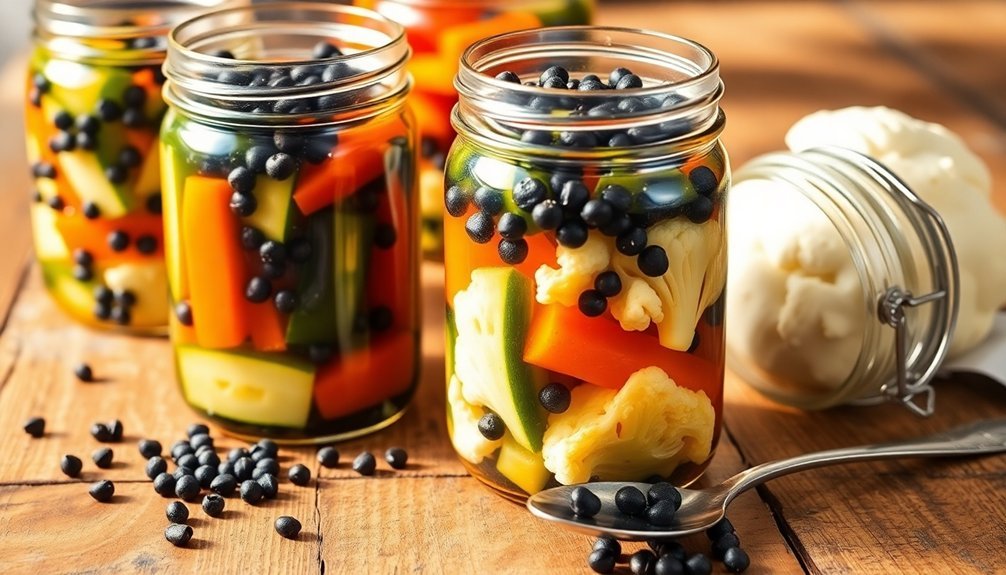
While pickling with black peppercorns might seem intimidating, it's actually a straightforward preservation method that yields delicious results. You'll need fresh or dried black peppercorns, high-grade vinegar with 5% acidity, and non-iodized pickling salt as your base ingredients. For extra flavor, you can add bay leaves, garlic, or a touch of sugar. Your recipe can easily be shared on Pinterest for other pickling enthusiasts to discover.
Start by sterilizing your jars and utensils to prevent contamination. Clean your peppercorns by soaking them in a water-vinegar solution.
Then, prepare your brine by combining water, vinegar, and salt. Bring this mixture to a boil over medium heat, then reduce to a simmer for a few minutes until everything's well dissolved.
Let the brine cool before adding it to your pickling jar. Make sure there's enough brine to completely cover your peppercorns, and leave proper headspace to prevent air bubbles.
You'll need to refrigerate your pickled peppercorns for at least 24 hours before using them to allow the flavors to develop. When stored properly in the refrigerator, they'll last up to six months.
Don't store them at room temperature, as this can lead to botulism.
Homemade Spiced Fruit Preserves
You'll need sterilized jars, fresh lids, and a reliable water bath canner as your essential equipment for creating spiced fruit preserves with black pepper.
When working with citrus and black pepper combinations, maintain a ratio of roughly 900g fruit to 3g freshly ground pepper to achieve the right balance of flavors.
For best results, you can adjust the pepper intensity by starting with less and gradually increasing to taste while keeping the fruit-to-citrus ratio at approximately 4:1 for proper acidity levels.
Wild strawberries provide an exceptionally intense flavor profile in preserves compared to regular strawberries.
Essential Preservation Equipment Needed
For successful spiced fruit preserves, proper equipment forms the backbone of your preservation process.
You'll need several essential pots, including a heavy-based pan for even heating and a nonreactive pot that's wider than deep to promote proper evaporation. A Dutch oven or large stockpot is vital for cooking preserves, while an unlined copper canning kettle provides efficient heat conduction. Fine mesh sieves help remove unwanted seeds from fruit preserves for a smoother texture.
Your utensil collection should include a wooden spoon for stirring, a slotted metal spoon for foam removal, and a wide-mouth funnel for clean jar filling.
Don't forget a potato masher to break down cooked fruit and a sturdy ladle for transferring preserves to jars.
Temperature monitoring is critical, so you'll want both a jam thermometer that reaches 105°C and a candy thermometer rated for at least 220°F. For testing consistency, keep a side plate handy.
Your canning equipment must include clean jars with new lids and rings, a water bath canner with rack, and a reliable jar lifter.
Stock up on clean tea towels for wiping jar tops and handling inevitable spills during the preservation process.
Citrus-Pepper Fruit Ratios
With your equipment ready, achieving the perfect citrus-pepper fruit preserves hinges on precise ingredient ratios. For every 900g of strawberries, you'll need 3g of freshly ground black pepper and 30g of lemon juice.
You'll want to divide your sugar into two portions: 580g for the initial maceration (sugar A) and 220g for later addition with pectin (sugar B).
The citrus component is flexible – while lemon juice is essential, you can enhance the flavor profile by adding orange zest and juice to taste.
For best results, quarter your larger strawberries to guarantee even cooking and proper absorption of the black pepper's heat. When incorporating the citrus elements, add the lemon juice during cooking, while any additional citrus zest should go in at the beginning.
You'll need 45g of apple pectin mixed with sugar B to achieve the right consistency.
Don't skip the maceration period – let your strawberry mixture rest for one hour before cooking. This ratio allows the black pepper's warmth to complement the fruit's sweetness without overpowering it.
Remember to cook the mixture to 217°F (103°C) for proper setting.
Dry Spice Blends

When you're creating dry spice blends with black pepper, proper storage techniques can extend their life up to 2-3 years in airtight glass containers kept away from heat and light.
You'll get the best results by following specific mixing ratios, typically using black pepper as 15-25% of your blend to avoid overpowering other ingredients.
Your black pepper can actually help preserve and enhance the flavors of other dried herbs in the mixture, as its natural compounds work to protect against oxidation and flavor loss.
Storage Life Plus Tips
Proper storage determines how long your dry spice blends will retain their potency and flavor. You'll want to understand the shelf life differences between various spice forms to maintain prime quality in your blends.
| Spice Type | Storage Life | Key Examples |
|---|---|---|
| Whole Spices | 3-4 years | Peppercorns, coriander seeds, whole nutmeg |
| Ground Spices | 2-3 years | Garlic powder, ground cinnamon, chili powder |
| Leafy Herbs | 1-3 years | Basil, oregano, thyme |
| Mixed Blends | 1-2 years | Curry powder, seasoning mixes, rubs |
To maximize your spice blend's longevity, you'll need to store them properly. Keep your containers airtight and place them in a cool, dark location away from your stove and direct sunlight. Don't use wet utensils when scooping spices, as moisture can lead to clumping and spoilage. It's smart to label your containers with purchase dates so you can track freshness.
You'll know it's time to replace your spices when they've lost their vibrant color or when you can't smell their distinctive aromas. Whole spices will last longer than ground versions, so consider buying whole and grinding as needed for the freshest flavors.
Mixing Ratios Matter
Creating successful spice blends depends on understanding the science of mixing ratios. When working with black pepper, you'll want to treat it as a medium to strong flavor and use it as a middle note in your preservation blends. For every 4 parts of your dominant spice, include 1 part black pepper to maintain balance without overpowering the mix.
To create a well-balanced preservative blend with black pepper, consider using a 1:1:1 ratio of top, middle, and base notes. You can pair black pepper with bright top notes like coriander seed or sumac, and deep base notes for richness.
If you're looking to emphasize black pepper's preservative qualities, adjust to a 1:2:1 ratio, making it the stronger middle note.
When combining black pepper with other preservative spices, remember that powder forms blend more uniformly. Mix mild flavors like parsley or chives more liberally, while using strong spices like cardamom or bay leaves sparingly.
You can scale these ratios up or down depending on your batch size, but always maintain the proportions to guarantee consistent preservation results.
Enhancing Other Dried Herbs
Black pepper's remarkable ability to enhance other dried herbs makes it an essential component in preservation blends. When you're creating herb mixtures, adding freshly ground black pepper can increase the bioavailability of other ingredients by up to 2000%, particularly for compounds like curcumin.
This enhancement occurs because piperine, black pepper's active component, improves your body's ability to absorb nutrients while stimulating circulation.
To maximize these benefits, you'll want to start with whole peppercorns and grind them fresh when creating your blends. Choose uniform, richly colored peppercorns with a strong aroma for the best results.
You can add 1-15 grams of black pepper per day to your herb mixtures, depending on your specific needs and the other ingredients involved.
Store your peppercorns in a cool, dry place away from light until you're ready to use them. When you're preparing preservation blends, grind your black pepper just before mixing it with other herbs.
This timing guarantees you'll retain the volatile oils and bioactive properties that make black pepper such an effective catalyst for enhancing other dried herbs' potency and absorption.
Oil-Based Pepper Preserving
When preserving with black pepper oil, understanding the extraction and storage methods is essential for both safety and effectiveness. The most reliable method involves steam distillation of dried black peppers, which yields a light yellow transparent liquid through controlled temperature processes and diethyl ether extraction.
You'll find that black pepper oil is a clear, colorless liquid that's volatile and won't dissolve in water. While it's an excellent preservative with numerous benefits, including reducing cholesterol and fighting inflammation, you'll need to handle it carefully. The oil's natural properties make it effective for both culinary uses and food preservation.
When you're creating oil-based pepper preserves, you must be aware of safety concerns, particularly regarding botulism risk. Always use high-quality EVO as your base oil, and store your preparations in the refrigerator immediately after making them.
While commercial pepper oils have extended shelf life due to industrial preservation methods, your homemade infusions will only last two to three weeks when refrigerated. Don't keep them at room temperature, as the low-acid, low-oxygen environment can become dangerous if not properly stored.
Fermenting With Black Pepper
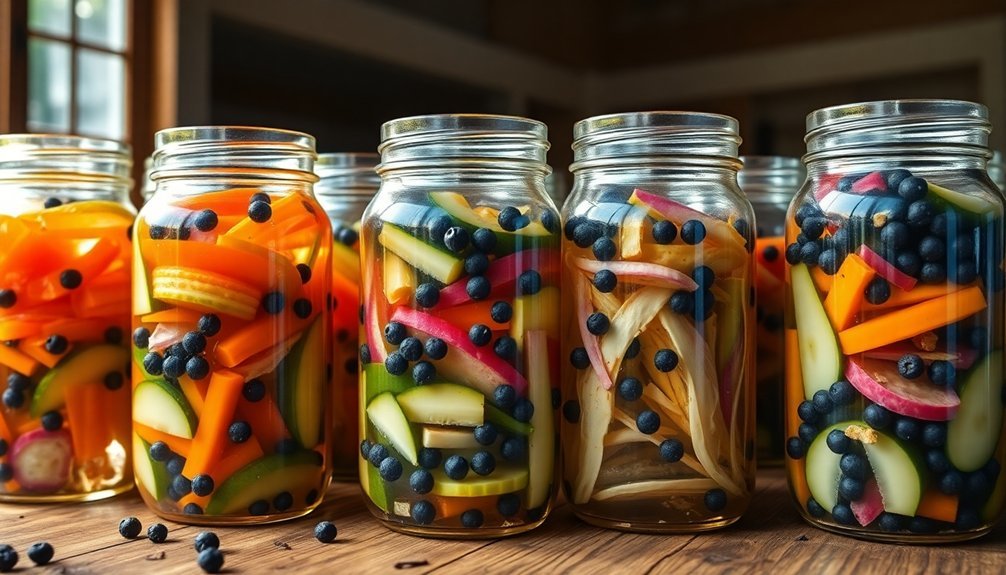
While oil-based preservation offers one approach, fermentation provides a time-tested method for preserving black pepper and enhancing its natural flavors. You'll need to start by creating a proper brine solution, using 3.5-5% salt concentration. Mix 1 tablespoon of salt per cup of filtered water, ensuring it's completely dissolved.
| Step | Action |
|---|---|
| 1 | Create brine with salt and filtered water |
| 2 | Pack peppers tightly in jar with optional ingredients |
| 3 | Submerge contents under brine with weight |
| 4 | Leave headspace and seal with appropriate lid |
| 5 | Ferment 1-5 weeks, burping regularly |
Pack your black peppercorns into a clean jar, adding complementary ingredients like garlic, ginger, or turmeric if desired. Keep everything submerged under the brine using a fermentation weight or small jar. You'll notice bubbling activity within the first 72 hours as beneficial bacteria begin their work.
Monitor your fermentation daily, releasing built-up gases and checking that contents remain submerged. Once you're satisfied with the fermentation level (anywhere from 1-5 weeks), transfer the jar to your refrigerator. The finished product should have a pleasantly sour and spicy aroma.
Salt-Cured Foods With Pepper
Salt-cured delicacies gain an exceptional depth of flavor when combined with black pepper's aromatic bite. To create these preserved meats, you'll need high-quality cuts like beef fillet or pork belly, along with a mixture of salt, sugar, herbs, and black pepper for the cure.
When curing your meat, avoid metal containers and make certain you've covered all surfaces evenly with the cure mixture. You'll need to refrigerate the meat for about two days, during which the salt will draw out moisture and concentrate the flavors.
Remember to discard any liquid that accumulates and turn the meat periodically for even curing.
After the curing process, rinse the meat under cold water and pat it dry. Now comes black pepper's starring role – create an even coating by rolling the meat in crushed peppercorns, which adds both texture and a distinctive peppery aroma to your finished product.
You can store your pepper-encrusted cured meat wrapped tightly in clingfilm for up to a week in the fridge, or extend its life to two weeks using a zipper-lock bag.
When you're ready to serve, slice it thinly and pair it with salads or remoulades.
Pepper-Infused Vinegar Solutions

Vinegar preservation masters swear by black pepper's ability to create vibrant infusions that last for months. You'll need high-grade vinegar with at least 5% acetic acid to guarantee proper preservation and flavor development.
When creating your pepper-infused vinegar, always start with sterilized jars, lids, and screwbands to maintain safety standards. Pack your clean peppers tightly into the jars, leaving minimal headspace, then pour the vinegar solution until it completely covers the contents.
If you're using a brine solution, combine vinegar, water, and non-iodized pickling salt, simmer it, and pour over the peppers. Remember to remove any air bubbles before sealing.
- Store your sealed jars in a cool, dark place below 65°F for maximum preservation
- Allow at least one month for the full flavor to develop before using
- Keep opened jars refrigerated to prevent spoilage
You can use your pepper-infused vinegar as a versatile condiment in soups, stews, and salads. When the vinegar runs low, simply top it off with new sterilized vinegar – the peppers will continue to infuse flavor.
Check regularly for signs of spoilage, such as mold or off odors, before using.
Frequently Asked Questions
Can I Substitute White Peppercorns for Black Peppercorns in Preservation Recipes?
Yes, you can substitute white peppercorns for black ones in preservation recipes. Just use slightly less since they're more intense. Be aware that they'll give your preserved foods a different, sometimes stronger flavor profile.
How Much Black Pepper Is Too Much When Preserving Food?
You shouldn't exceed 2-3% black pepper by weight of food when preserving. If you're tasting burning sensations or experiencing digestive discomfort, you've used too much. Start with less and adjust accordingly.
Does Cracked Pepper Preserve Food Differently Than Whole or Ground Pepper?
Yes, you'll find cracked pepper preserves food differently – it offers better preservation than ground pepper but less than whole peppercorns. It's a middle-ground option that maintains more essential oils than ground pepper.
Will Black Pepper Affect the Color of Light-Colored Preserves?
Yes, black pepper will affect your light-colored preserves. You'll notice darkening and visible specks, especially in clear or translucent preserves. The finer you grind it, the more evenly it'll disperse through your mixture.
Can I Mix Different Peppercorn Varieties When Preserving Food?
Yes, you can mix different peppercorn varieties when preserving! Try combining black and green for robust and fresh flavors, or blend white and black peppercorns to create a complex yet balanced taste in your preserves.
In Summary
You've now got a solid foundation in time-tested pepper preservation methods. Whether you're pickling vegetables with peppercorns, creating spiced fruit preserves, or experimenting with fermentation, you'll find black pepper's antimicrobial properties help protect your foods while adding complex flavor. Try combining these techniques to develop your own preservation style, and don't forget to label and date your creations for future reference.
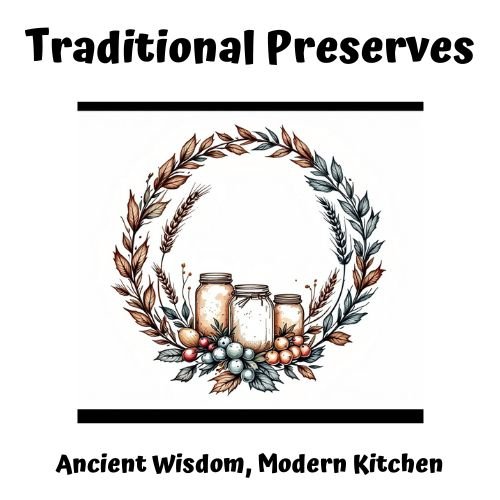

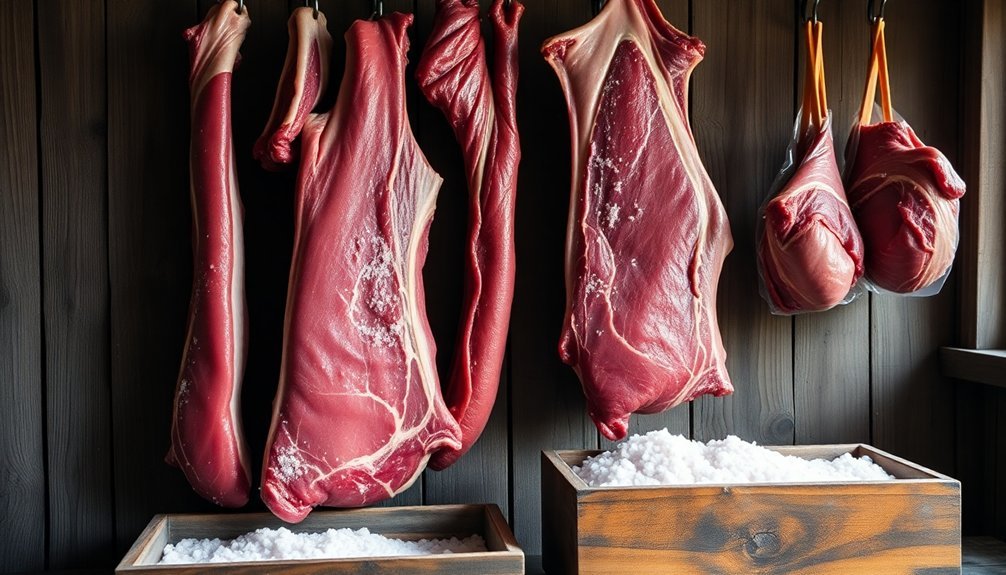
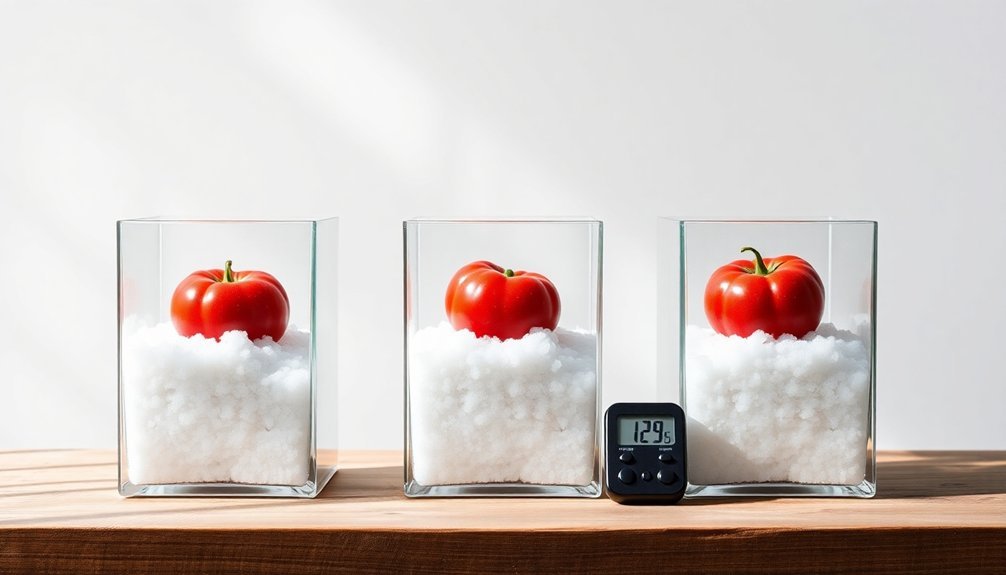
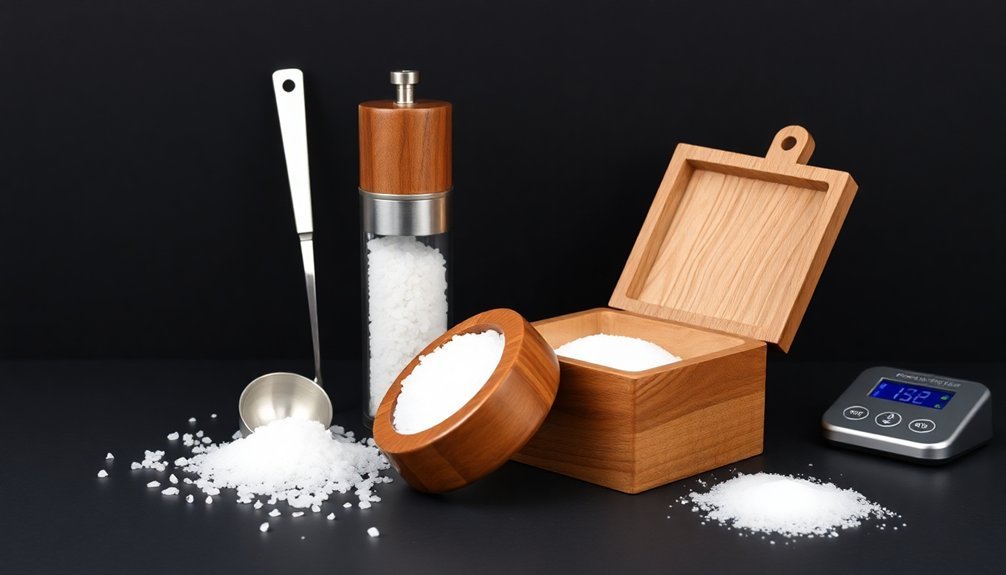
Leave a Reply